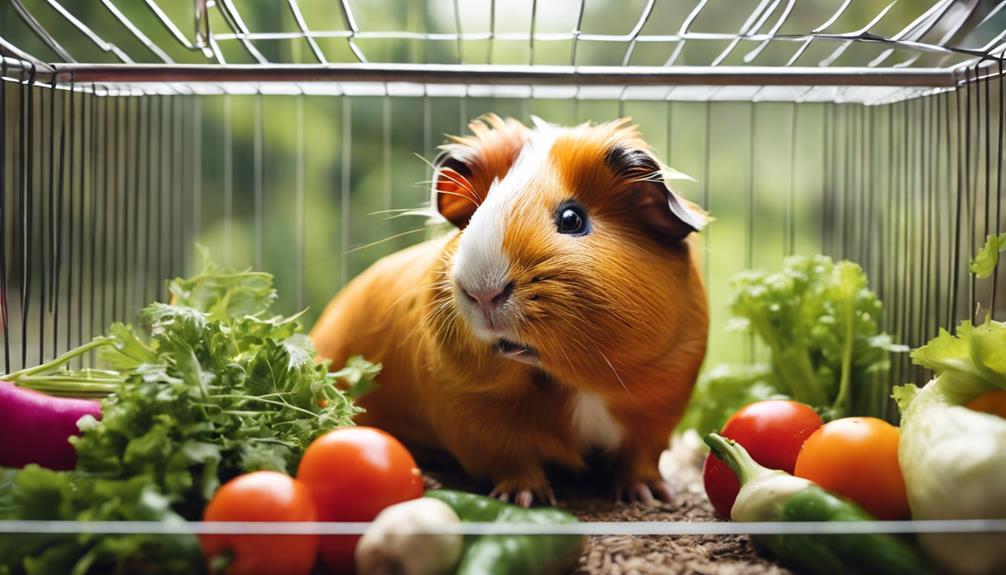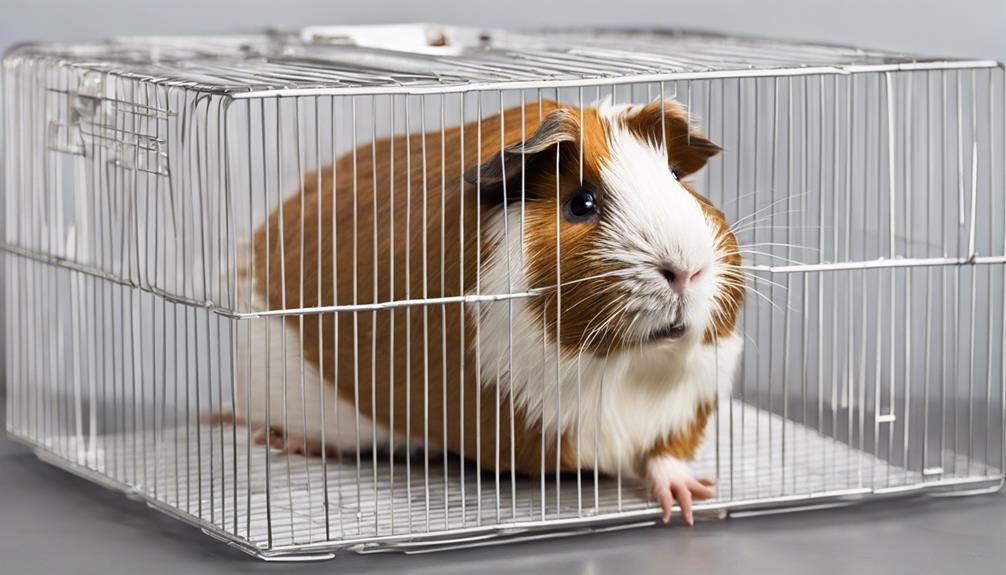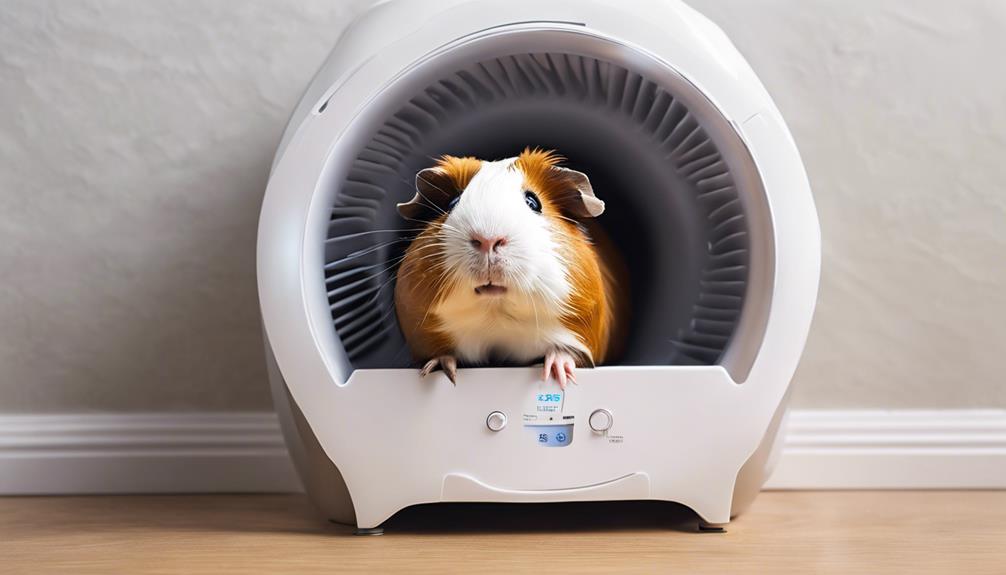How Environmental Factors Affect Guinea Pig Health

Environmental factors play a key role in the health of guinea pigs. Temperature, humidity, and air quality are crucial aspects that need to be carefully managed to ensure the well-being of these small pets.
Disruptions in this balance can have profound effects on the health of guinea pigs. It is important to monitor and control these factors to create a healthy and comfortable environment for your furry friends.
Key Takeaways
- Proper environmental conditions like temperature, humidity, and ventilation are crucial for guinea pig health.
- Cleanliness, low-dust bedding, and good air quality help prevent respiratory issues in guinea pigs.
- Natural lighting impacts their well-being, affecting Vitamin D synthesis, mood, and circadian rhythms.
- Minimizing stress from noise pollution and providing a peaceful environment is vital for guinea pig health.
Ideal Temperature Range
What's the ideal temperature range for maintaining the health of guinea pigs?
Guinea pigs are sensitive animals that require a stable and moderate environment to thrive. Temperature regulation is important for their well-being. The perfect temperature range for guinea pigs typically falls between 65 to 75 degrees Fahrenheit (18 to 24 degrees Celsius). This range guarantees that they aren't too cold or too hot, preventing any stress or health issues.
To maintain this perfect temperature range, various heating options can be considered. Heating pads, ceramic heat emitters, and enclosed heated spaces are effective methods to provide warmth for guinea pigs during colder periods. It's important to monitor the temperature regularly, making sure that it remains within the recommended range.
Proper Humidity Levels
Maintaining the ideal temperature range for guinea pigs guarantees their well-being; now, turning our focus to the importance of proper humidity levels in safeguarding their health.
Humidity regulation plays a pivotal role in ensuring the respiratory health of these small companions. Guinea pigs are sensitive creatures, and high humidity levels can create an environment where respiratory issues may arise. On the other hand, low humidity can lead to dry skin and respiratory discomfort. Hence, striking a balance is key.
To promote the best respiratory health, aim for a humidity level between 30% and 70%. This range mimics their natural habitat, promoting comfort and well-being. Monitoring humidity levels regularly and making adjustments as needed is a key aspect of caring for guinea pigs.
Providing adequate ventilation and using a hygrometer to measure humidity levels can help maintain a healthy environment for these adorable pets. By paying attention to humidity regulation, you're taking a proactive step in safeguarding the respiratory health of your beloved guinea pigs.
Importance of Ventilation

Proper ventilation is essential for ensuring excellent air quality and promoting the overall health and well-being of guinea pigs. Adequate airflow and ventilation play a critical role in maintaining a healthy environment for these small pets.
Here are some key points highlighting the importance of ventilation:
- Air Circulation: Good ventilation guarantees proper air circulation within the guinea pig's habitat, preventing the buildup of stale or contaminated air.
- Respiratory Health: Adequate ventilation helps in reducing the concentration of airborne irritants that could potentially affect the respiratory health of guinea pigs.
- Preventing Humidity: Proper ventilation aids in controlling humidity levels, preventing the growth of mold and mildew which can be harmful to the guinea pig's health.
- Temperature Regulation: Ventilation helps in regulating the temperature within the enclosure, preventing overheating and creating a comfortable living space for the guinea pigs.
Clean Bedding and Habitat
To maintain best health for guinea pigs, the choice of bedding materials is vital as it directly impacts their well-being. Ensuring a clean habitat isn't just about aesthetics; it's essential for preventing potential respiratory issues that can arise from dirty living conditions. By prioritizing cleanliness and selecting suitable bedding, guinea pig owners can create a safe and healthy environment for their beloved pets.
Bedding Materials Impact Health
Regularly changing the bedding material in a guinea pig's habitat can have a substantial impact on their health and overall well-being. When selecting bedding options, consider the health benefits they offer. Here are some key points to keep in mind regarding bedding choices and respiratory health:
- Guarantee dust-free bedding to minimize respiratory issues.
- Select bedding made from natural materials like paper or hay to reduce the risk of allergies.
- Avoid cedar or pine bedding as they can release harmful aromatic hydrocarbons.
- Make certain the bedding is absorbent to maintain a dry and clean environment for your guinea pig.
Habitat Cleanliness Is Essential
Maintaining a clean habitat, including fresh bedding, is important for ensuring the health and well-being of your guinea pig. Food safety is vital, as dirty bedding can harbor bacteria and mold, posing a risk to your pet's health. Regularly changing the bedding helps prevent these issues, creating a safe and hygienic environment.
Additionally, a clean habitat is essential for meeting your guinea pig's exercise needs. A fresh living space encourages activity and play, supporting their physical and mental well-being. By prioritizing cleanliness in your guinea pig's habitat, you not only promote their health but also provide a comfortable and stimulating environment for them to thrive.
Prevent Respiratory Issues
Maintaining a clean habitat and fresh bedding for your guinea pig is crucial in preventing respiratory issues and promoting overall health. Guinea pigs are particularly sensitive to environmental factors like dust and mold, which can worsen respiratory problems.
To safeguard your furry friend's well-being, follow these essential tips:
- Regular Cleaning: Clean your guinea pig's cage at least once a week to remove dust, dirt, and hay that can trigger allergies.
- Proper Ventilation: Guarantee good airflow in the habitat to prevent the buildup of mold and mildew.
- Low-Dust Bedding: Opt for bedding materials like paper-based options to minimize dust particles that can irritate the respiratory system.
- Dry Environment: Maintain the cage dry to prevent mold growth, which can be harmful to your guinea pig's delicate respiratory system.
Effects of Lighting
Lighting plays an important role in the well-being of guinea pigs, as natural light provides essential benefits for their health and happiness.
However, it's important to carefully consider the use of artificial lighting to prevent any negative effects on these sensitive creatures.
Maintaining a proper light cycle is essential in ensuring the overall wellness of guinea pigs in captivity.
Natural Light Benefits
The gentle caress of natural light upon a guinea pig's habitat can greatly enhance their overall well-being and vitality. Natural light offers numerous health benefits by aligning with the guinea pig's natural rhythms, promoting a harmonious internal balance.
Here are four ways in which natural light benefits these adorable creatures:
- Vitamin D Synthesis: Natural light aids in the production of Vitamin D, vital for bone health and overall immune function.
- Regulation of Circadian Rhythms: Exposure to natural light helps regulate guinea pigs' sleep-wake cycles, promoting better rest and activity patterns.
- Mood Enhancement: Sunlight can uplift the spirits of guinea pigs, reducing stress and anxiety.
- Enhanced Visual Acuity: Natural light improves visibility within the habitat, allowing guinea pigs to navigate their environment more effectively.
Artificial Light Considerations
In the domain of guinea pig care, the impact of artificial light on their health and well-being is a significant consideration that demands thoughtful attention. Light intensity plays an important role in regulating their circadian rhythm, affecting their sleep patterns. Guinea pigs, like many animals, rely on a consistent day-night cycle to maintain their natural behaviors and functions.
Excessive exposure to artificial light can disrupt this balance, leading to potential health issues and disturbances in their rest. Additionally, considering guinea pigs' sensitive eyes, ensuring suitable lighting levels is essential for their eye health. Careful management of artificial light can contribute importantly to the overall well-being and comfort of these beloved pets, emphasizing the importance of creating a suitable lighting environment in their living spaces.
Light Cycle Importance
A harmonious balance of natural and artificial light cycles is important for maintaining the well-being and vitality of guinea pigs. Proper light exposure affects their circadian rhythm, influencing their overall health and behavior. Here are key points to think about:
- Natural Light: Make sure guinea pigs receive exposure to natural daylight, as it helps regulate their internal clock and promotes a sense of normalcy.
- Avoid Overexposure: Excessive artificial light can disrupt their circadian rhythm, leading to stress and potential health issues.
- Dark Period: Allow for a period of darkness each day to mimic their natural habitat, aiding in rest and relaxation.
- Consistent Schedule: Establish a consistent light cycle to provide stability and routine for guinea pigs, supporting their well-being.
Noise Levels and Stress
Excessive noise exposure can greatly contribute to the stress levels experienced by guinea pigs. These gentle creatures are highly sensitive to their surroundings, and noise pollution can have a significant impact on their well-being. Loud sounds, whether from household appliances, construction work, or even constant chatter, can disrupt their sense of security and lead to increased stress levels. Guinea pigs have a keen sense of hearing, making them particularly vulnerable to high-decibel environments.
In homes where noise levels are consistently high, guinea pigs may exhibit signs of distress such as restlessness, decreased appetite, or even behavioral changes. It's vital for their caregivers to create a peaceful and quiet environment to guarantee the best health and happiness of these small companions. By minimizing exposure to loud noises and providing a tranquil living space, the stress levels of guinea pigs can be effectively managed. Remember, a calm and serene atmosphere is essential for the overall well-being of these adorable pets.
Air Quality Considerations

High-quality air is paramount for the ultimate health and well-being of guinea pigs, as they're particularly susceptible to the effects of poor air quality due to their delicate respiratory systems. Maintaining a clean and well-ventilated environment is essential to support their respiratory health and overall wellness. Here are some key considerations for ensuring excellent air quality for guinea pigs:
- Air Filtration Systems: Investing in a quality air filtration system can help remove dust, dander, and other harmful particles from the air, reducing the risk of respiratory issues in guinea pigs.
- Pollution Control: Minimizing exposure to environmental pollutants such as cigarette smoke, strong odors, and fumes from household cleaners is vital to protect the sensitive respiratory systems of guinea pigs.
- Regular Cage Cleaning: Routine cleaning of cages and bedding can help prevent the buildup of ammonia and other harmful substances that can compromise air quality.
- Proper Ventilation: Ensuring proper ventilation in the living area of guinea pigs helps maintain fresh air circulation, reducing the risk of respiratory problems.
Outdoor Vs. Indoor Environments
For guinea pigs, the choice between outdoor and indoor environments greatly impacts their overall well-being and health. While outdoor environments can provide guinea pigs with a sense of natural exploration and fresh air, they also pose significant dangers. Predators, extreme weather conditions, and potential exposure to harmful pesticides are all outdoor dangers that can jeopardize a guinea pig's safety and well-being. On the other hand, indoor environments offer a controlled setting that protects guinea pigs from such risks, ensuring their safety and security.
The impact of weather on guinea pigs can't be underestimated. Extreme temperatures, humidity, and sudden weather changes can have adverse effects on a guinea pig's health, leading to stress, respiratory issues, and other health consequences. Indoor environments provide a stable climate that helps regulate temperature and humidity levels, reducing the risk of weather-related health problems for guinea pigs.
Ultimately, while outdoor environments may appeal to guinea pigs' natural instincts, the safety and health benefits of indoor environments make them a preferred choice for ensuring the well-being of these beloved pets.
Frequently Asked Questions
Can Guinea Pigs Be Kept in the Same Room as Other Pets, Such as Cats or Dogs?
In the delicate dance of introducing guinea pigs to other pets, like cats or dogs, managing pet interactions in the home is akin to orchestrating a symphony of harmony and caution, ensuring peace and safety for all furry friends.
How Often Should Guinea Pig Cages Be Deep Cleaned and Sanitized?
Guinea pig cages should be deep cleaned and sanitized every 1-2 weeks to maintain a healthy environment. Regular bedding changes are vital for odor control and overall well-being. Consistent cage maintenance promotes a happy pet.
Are There Any Specific Plants or Flowers That Should Be Avoided in a Guinea Pig's Living Environment?
When considering a guinea pig's living environment, it's important to be cautious about toxic plants. Some plants can trigger allergies or even be harmful. It's advisable to research safe alternatives and take necessary precautions to guarantee a healthy habitat.
What Are the Potential Health Risks of Using Scented Bedding or Air Fresheners Near Guinea Pigs?
Exposure to scented bedding or air fresheners can pose health risks to guinea pigs. The fragrances in these products may trigger allergies or respiratory irritation in these small animals, causing discomfort and potential health issues.
How Can Owners Prevent Pests, Such as Mites or Fleas, From Affecting Their Guinea Pig's Health in an Indoor Environment?
To prevent pests like mites or fleas in an indoor environment and promote guinea pig health, owners can utilize natural remedies and prevention methods. Regularly cleaning and disinfecting indoor habitats, practicing good hygiene, and using parasite control products can help safeguard their furry friends.











